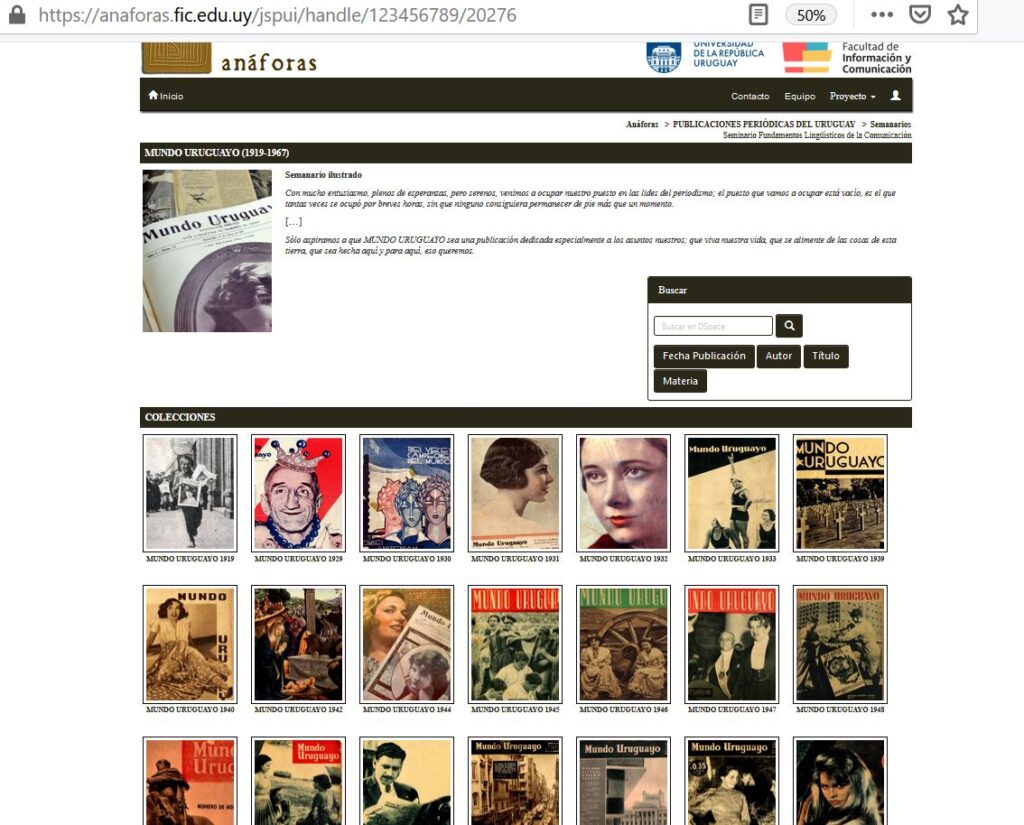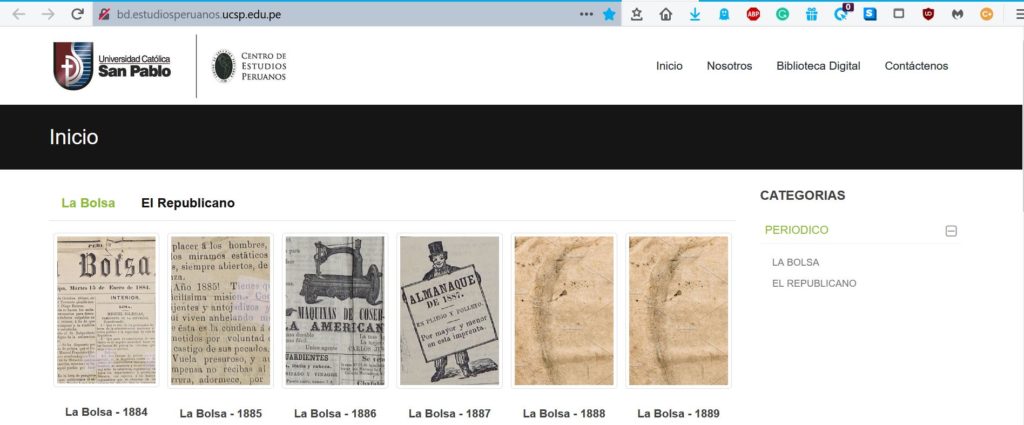Tag: open acces
[Open Access] Anáforas: Publicaciones Periódicas Del Uruguay
Libraries for me are always open, however, due to COVID-19, we can talk all day about how it has restricted our access to the physical spaces and books and periodicals. Thus, our access to electronic editions acquires special importance. We all know the fact that the marginal cost of producing an electronic version is significantly lower than the price we pay to purchase a multi-user, unlimited simultaneous user license for an electronic book. Thus, as UC has already noted that Open Access becomes a point of departure from the traditional business models. In Latin America as well as in many parts of the global south, OA means even more due to institutional budgetary constraints.
One such journal that provides insight into the life in Uruguay is “Mundo Uruguayo.” Its issues have been digitized for the period from 1919-1967 and are available in the repository of “Universidad de la Republica (UdelaR)“.
Image 1: The digitized issues of Mundo Uruguayo.
The database can be searched for the individual issues and these can be downloaded in their PDF format. The image below shows a specific issue of Mundo Uruguayo, which due to its illustrated nature provides the user interesting insights into the evolution of society.
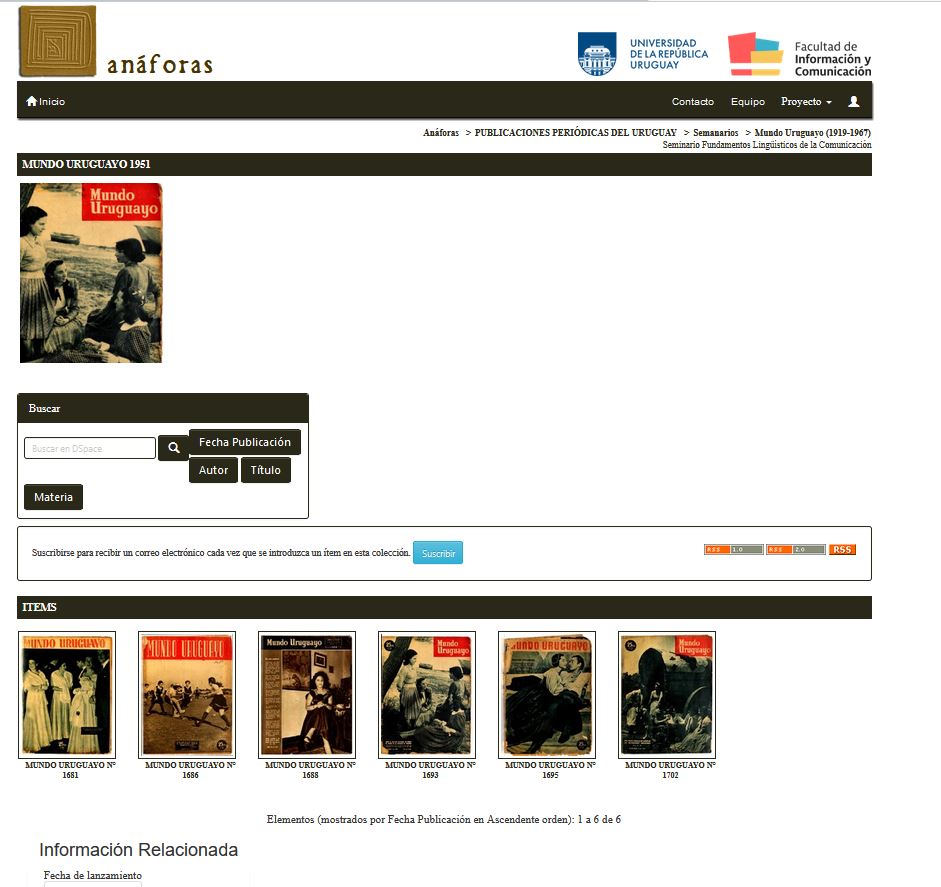 Image 2: The landing page of the digitized 1951 issues of Mundo Uruguayo.
Image 2: The landing page of the digitized 1951 issues of Mundo Uruguayo.
(Open Access)Herencia: Centuries of Spanish Legal Documents at Library of Congress!
Transcribing is sacred when it comes to different historical documents and crowdsourcing seems to be an acceptable mantra for many of such projects. One such project is that of transcribing Spanish Legal documents that were acquired by the Library of Congress. This volunteer based effort warrants attention and thus this post. The collection is located here. The screenshot below shows the landing page of the collection.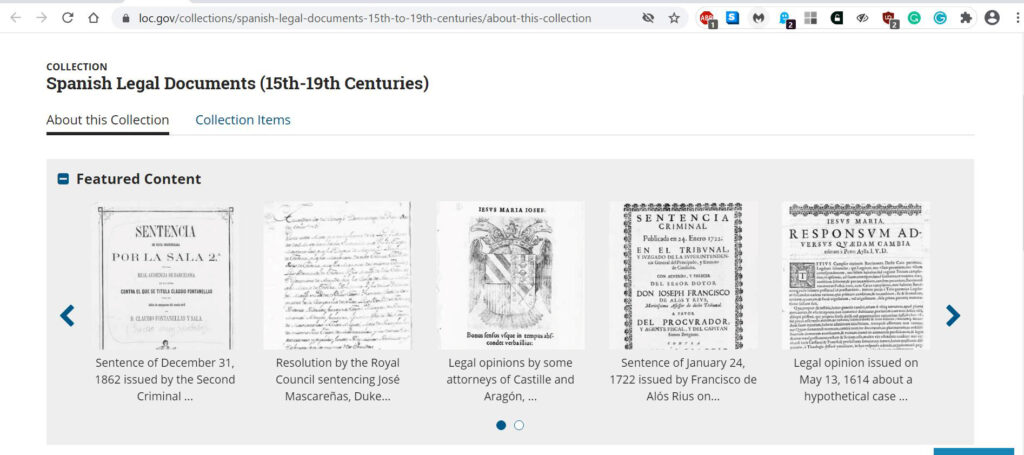
Spanish Legal Documents (15th-19th Centuries) at Library of Congress
One might wonder, how the interface for transcribing looks like, and guidance on how to proceed? Below is the screenshot that can provide us some insight.
Perhaps one can consider volunteering for transcribing these Spanish legal documents?
(Open Access) KĀRAWĀN- Afghanistan Newspaper Digitized by University of Nebraska Libraries
Since the US invasion of Afghanistan, we continue to hear about the success of US policies when it comes to the nation-building in a war-torn land. We also continue hearing the ongoing violence in the country, and how we are winning the war. Policies aside, I personally support and stand by our American troops our soldiers overseas!
We rarely hear about the projects that lead to a sort of cultural memory preservation or often these are relegated to backstage. And our homeland is a major sponsor of such projects overseas. Domestically, public institutions of higher education continue to perform miracles by offering more and more digitized resources. Open Access matters!
Karawan is indeed a breath of fresh air in the OA domain. The University of Nebraska has digitized its issues. That can be accessed here.
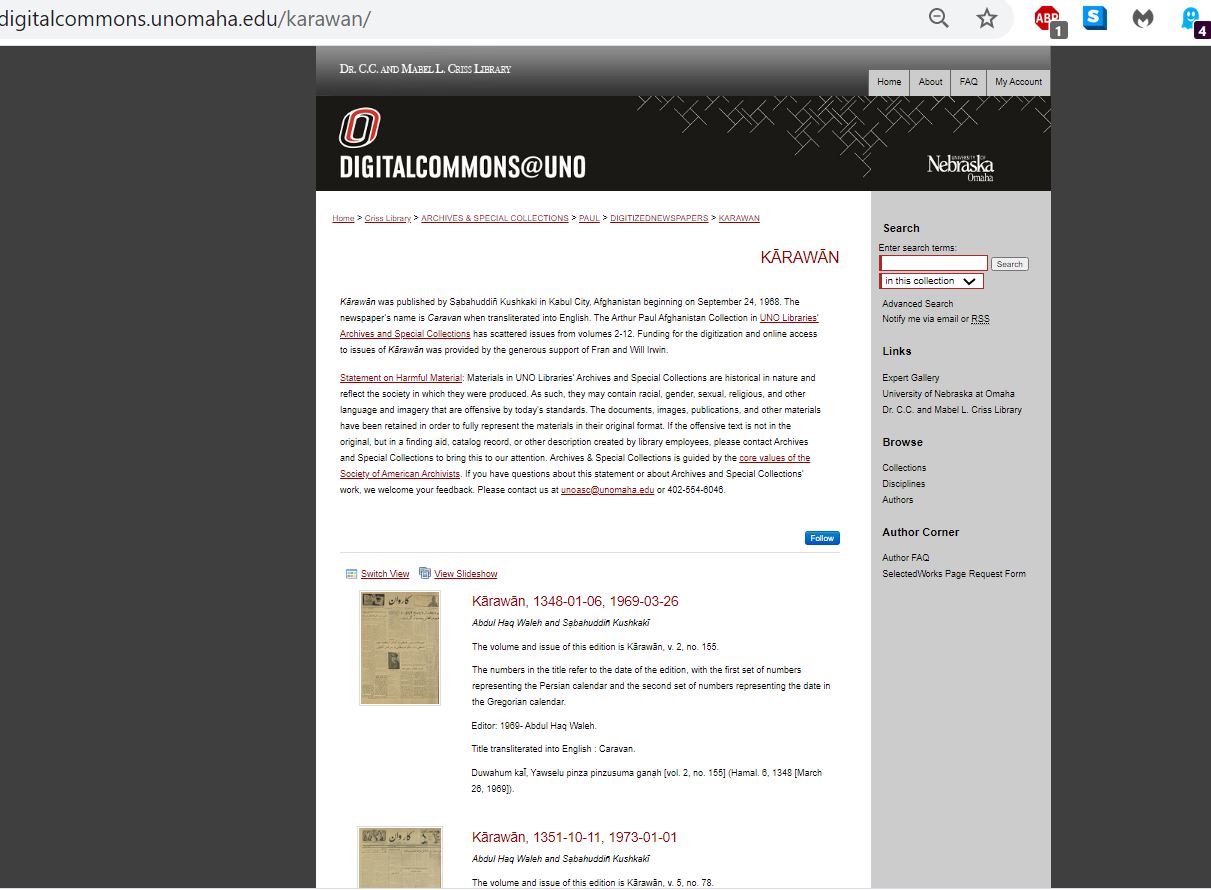
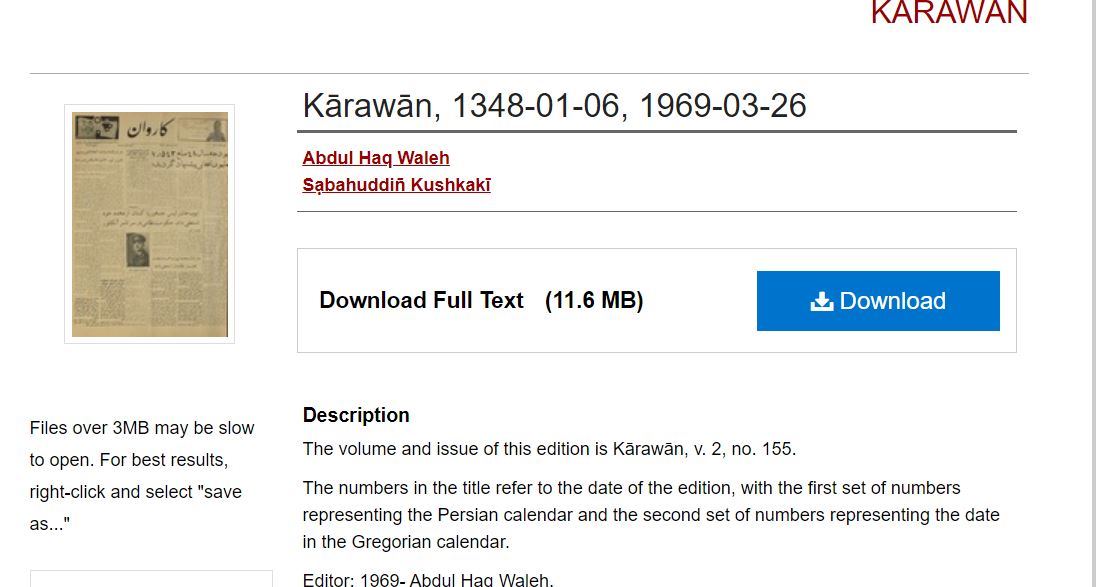
The site-description states that it was established by Sạbahuddin̄ Kushkakī (not to be confused with Burhanuddin Kushkaki) on 24 September 1968. Who was Sạbahuddin̄ Kushkakī is the question to which the answer cannot be simple? The US National Security Archive at GW University provides some insight on him in the context of National Endowment for Democracy (NED). A document entitled Afghanistan Democratic Education Project is informative of the early US efforts to carry out democratic goodwill projects. One can also find more information about him through the FOIA releases here (page.3) I will not dwell upon the trajectory of “the American Friends of Afghanistan, as one can read into who could have been its executive director at one point: z.k.”
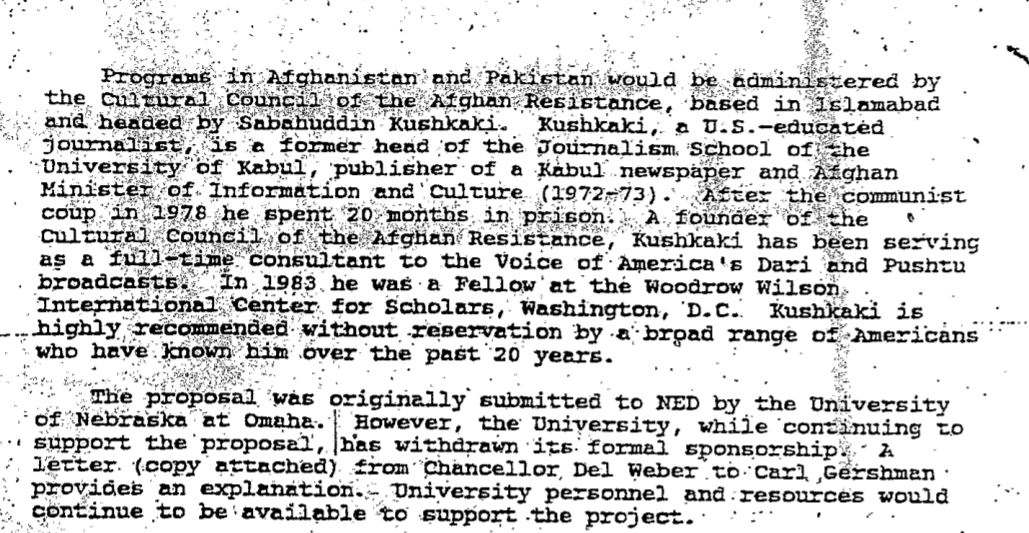
The point here is that due to these policies we have an effect of unintended consequences– we have access to Karawan!
Independent and Revolutionary Mexican Newspapers Open Access Collection Released (CRL)
CRL announced today it has released more than 477 titles of the 19th-century Mexican newspapers that total 134,208 pages in their digitized format. Most of these are scanned from existing microfilms thus some of the issues can have quality-related issues. The collection closely resembles the digital collection of Hemeroteca that is at UNAM. Nevertheless, in times of constraints on access to the physical collections, this resource remains an irreplaceable treasure trove of information on the 19th Mexico. It is an OA collection for a world-wide audience to use.
East View’s description states, “Most of the titles in the Independent and Revolutionary Mexican Newspapers collection are from the Nettie Lee Benson Latin American Collection, a research library at the University of Texas at Austin for area studies on Mexico, Central and South America, the Caribbean, and the Latino presence in the United States. The Nettie Lee Benson Latin American Collection is regarded by many as the preeminent Latin American library in the United States and is particularly rich in out-of-the-ordinary materials issued in small print runs, many difficult to acquire when first published and impossible to acquire today.”
Below are some of the images of the database.
Open Access: Peruvian Historical Newspapers Digitized
19th Century Newspapers from Arequipa, Peru
El Republicano (1825-1855) and La Bolsa (1860-1915) have been digitized as a result of collaboration between the Center for Research Libraries and Universidad Católica San Pablo, Peru. These newspapers are available at http://bd.estudiosperuanos.ucsp.edu.pe/ and are also at available through CRL.:
- La Bolsa http://catalog.crl.edu/record=b2911279~S1
- El Republicano http://catalog.crl.edu/record=b2910775~S5
Below is a screenshot of La Bolsa on the page of UCSP. The image is being used for fair academic use only. There are other historical newspapers and images that can be accessed using the digital library of UCSP
The landing page of La Bolsa.
